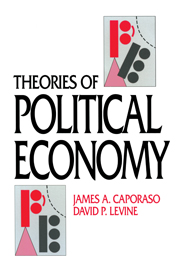Book contents
- Frontmatter
- Contents
- Preface
- Theories of political economy
- Introduction
- 1 Politics and economics
- 2 The classical approach
- 3 Marxian political economy
- 4 Neoclassical political economy
- 5 Keynesian political economy
- 6 Economic approaches to politics
- 7 Power-centered approaches to political economy
- 8 State-centered approaches to political economy
- 9 Justice-centered theories
- Conclusion
- Bibliography
- Index
3 - Marxian political economy
Published online by Cambridge University Press: 05 June 2012
- Frontmatter
- Contents
- Preface
- Theories of political economy
- Introduction
- 1 Politics and economics
- 2 The classical approach
- 3 Marxian political economy
- 4 Neoclassical political economy
- 5 Keynesian political economy
- 6 Economic approaches to politics
- 7 Power-centered approaches to political economy
- 8 State-centered approaches to political economy
- 9 Justice-centered theories
- Conclusion
- Bibliography
- Index
Summary
With Marxism, there are many possible vantage points from which one can discuss political economy. Marxists have seen the political in the very separation of civil society from the public arena (limiting rights and equality to the latter), the class process by which surplus value is “appropriated” under capitalism, the role of the state in managing the interests and affairs of capital, political (that is, state-backed) guarantees of property rights, revolutionary activity to alter the political institutions of capitalism, and the bargaining between labor and capital for control of the economic surplus.
Although these vantage points may supply political content to Marxian economics, the senses in which they do so are not obvious. Even the concept of class, certainly a mainstay of Marxian theory, is not obviously political. Classes can exist even in a society where individuals are disconnected, unaware of common interests, and politically unorganized. Nevertheless, owners of capital may exist and hire those who sell their labor power. Further, production of value and surplus value can occur. In this kind of economy, politics would not be evident in the daily operation of class processes (though the state would have to underwrite private property rights). There would be no struggle for the surplus, no power bargaining between labor and capital, and no state intervention to control labor.
The use of the term “political economy” in Marxian theory does not directly refer us to studies of the relation between economics and politics.
- Type
- Chapter
- Information
- Theories of Political Economy , pp. 55 - 78Publisher: Cambridge University PressPrint publication year: 1992



